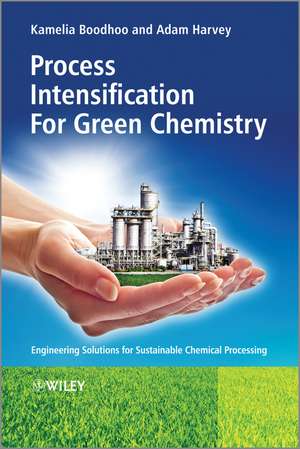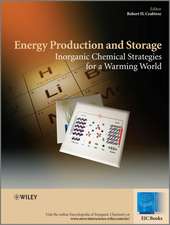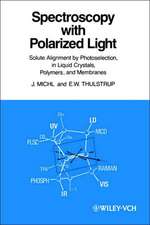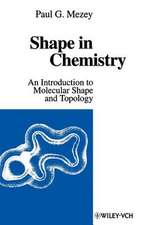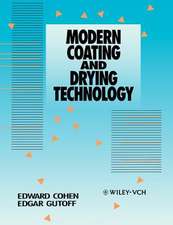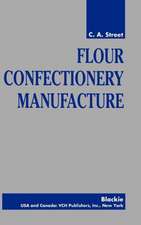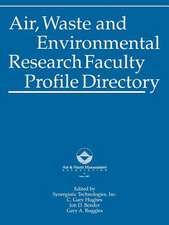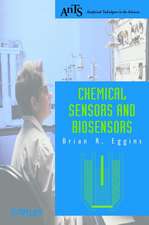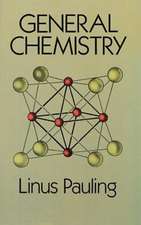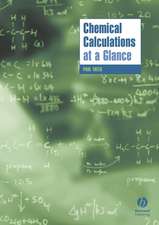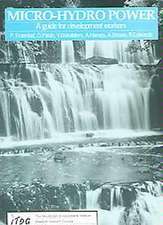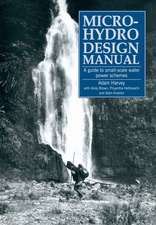Process Intensification for Green Chemistry – Engineering Solutions for Sustainable Chemical Processing
Autor K Boodhooen Limba Engleză Hardback – 31 ian 2013
The successful implementation of greener chemical processes relies not only on the development of more efficient catalysts for synthetic chemistry but also, and as importantly, on the development of reactor and separation technologies which can deliver enhanced processing performance in a safe, cost-effective and energy efficient manner. Process intensification has emerged as a promising field which can effectively tackle the challenges of significant process enhancement, whilst also offering the potential to diminish the environmental impact presented by the chemical industry. Following an introduction to process intensification and the principles of green chemistry, this book presents a number of intensified technologies which have been researched and developed, including case studies to illustrate their application to green chemical processes. Topics covered include: * Intensified reactor technologies: spinning disc reactors, microreactors, monolith reactors, oscillatory flow reactors, cavitational reactors * Combined reactor/separator systems: membrane reactors, reactive distillation, reactive extraction, reactive absorption * Membrane separations for green chemistry * Industry relevance of process intensification, including economics and environmental impact, opportunities for energy saving, and practical considerations for industrial implementation. Process Intensification for Green Chemistry is a valuable resource for practising engineers and chemists alike who are interested in applying intensified reactor and/or separator systems in a range of industries to achieve green chemistry principles.
Preț: 1002.09 lei
Preț vechi: 1101.20 lei
-9% Nou
191.74€ • 200.74$ • 158.66£
Carte tipărită la comandă
Livrare economică 05-19 aprilie
Specificații
ISBN-10: 047097267X
Pagini: 430
Dimensiuni: 170 x 244 x 24 mm
Greutate: 0.79 kg
Editura: Wiley
Locul publicării:Chichester, United Kingdom
Public țintă
Practicing chemical engineers and chemists who are interested in applying intensified reactor and/or separator systems in a range of industries such as petrochemicals, fine/specialty chemicals, pharmaceutical etc.; advanced undergraduates and graduate students studying advanced reactor design, process intensification, clean technology, green chemistry, chemical engineering.Cuprins
List of Contributors xiii Preface xv 1 Process Intensification: An Overview of Principles and Practice 1 Kamelia Boodhoo and Adam Harvey 1.1 Introduction 1 1.2 Process Intensification: Definition and Concept 2 1.3 Fundamentals of Chemical Engineering Operations 3 1.4 Intensification Techniques 11 1.5 Merits of PI Technologies 21 1.6 Challenges to Implementation of PI 24 1.7 Conclusion 25 Nomenclature 26 Greek Letters 26 References 27 2 Green Chemistry Principles 33 James Clark, Duncan Macquarrie, Mark Gronnow and Vitaly Budarin 2.1 Introduction 33 2.2 The Twelve Principles of Green Chemistry 35 2.3 Metrics for Chemistry 37 2.4 Catalysis and Green Chemistry 41 2.5 Renewable Feedstocks and Biocatalysis 46 2.6 An Overview of Green Chemical Processing Technologies 50 2.7 Conclusion 55 References 55 3 Spinning Disc Reactor: Continuous Thin-film Flow Processing for Green Chemistry Applications 59 Kamelia Boodhoo 3.1 Introduction 59 3.2 Design and Operating Features of SDRs 60 3.3 Characteristics of SDRs 66 3.4 Case Studies: SDR Application for Green Chemical Processing and Synthesis 76 3.5 Hurdles to Industry Implementation 84 3.6 Conclusion 86 Nomenclature 87 Greek Letters 87 Subscripts 87 References 87 4 Micro Process Technology and Novel Process Windows - Three Intensification Fields 91 Svetlana Borukhova and Volker Hessel 4.1 Introduction 91 4.2 Transport Intensification 93 4.3 Chemical Intensification 108 4.4 Process Design Intensification 128 4.5 Industrial Microreactor Process Development 137 4.6 Conclusion 140 Acknowledgement 141 References 141 5 Green Chemistry in Oscillatory Baffled Reactors 157 Adam Harvey 5.1 Introduction 157 5.2 Case Studies: OBR Green Chemistry 164 5.3 Conclusion 170 References 172 6 Monolith Reactors for Intensified Processing in Green Chemistry 175 Joseph Wood 6.1 Introduction 175 6.2 Design of Monolith Reactors 176 6.3 Hydrodynamics of Monolith Reactors 179 6.4 Advantages of Monolith Reactors 182 6.5 Applications in Green Chemistry 185 6.6 Conclusion 192 Acknowledgement 193 Nomenclature 193 Greek Letters 193 Subscripts and Superscripts 193 References 193 7 Process Intensification and Green Processing Using Cavitational Reactors 199 Vijayanand Moholkar, Parag Gogate and Aniruddha Pandit 7.1 Introduction 199 7.2 Mechanism of Cavitation-based PI of Chemical Processing 200 7.3 Reactor Configurations 201 7.4 Mathematical Modelling 207 7.5 Optimization of Operating Parameters in Cavitational Reactors 209 7.6 Intensification of Cavitational Activity 211 7.7 Case Studies: Intensification of Chemical Synthesis using Cavitation 214 7.8 Overview of Intensification and Green Processing Using Cavitational Reactors 218 7.9 The Future 221 7.10 Conclusion 222 References 222 8 Membrane Bioreactors for Green Processing in a Sustainable Production System 227 Rosalinda Mazzei, Emma Piacentini, Enrico Drioli and Lidietta Giorno 8.1 Introduction 227 8.2 Membrane Bioreactors 228 8.3 Biocatalytic Membrane Reactors 230 8.4 Case Studies: Membrane Bioreactors 232 8.5 Green Processing Impact of Membrane Bioreactors 245 8.6 Conclusion 247 References 247 9 Reactive Distillation 251 Anton Kiss 9.1 Introduction 251 9.2 Principles of RD 252 9.3 Design, Control and Applications 253 9.4 Modelling RD 256 9.5 Economical and Technical Evaluation 257 9.6 Case Studies: RD 261 9.7 Green Processing Impact of RD 270 9.8 Conclusion 271 References 271 10 Reactive Extraction Technology 275 Keat T. Lee and Steven Lim 10.1 Introduction 275 10.2 Case Studies: Reactive Extraction Technology 277 10.3 Impact on Green Processing and Process Intensification 284 10.4 Conclusion 286 References 286 11 Reactive Absorption 289 Anton A. Kiss 11.1 Introduction 289 11.2 Theory and Models 290 11.3 Equipment, Operation and Control 291 11.4 Applications in Gas Purification 293 11.5 Green Processing Impact of RA 307 11.6 Challenges and Future Prospects 307 References 307 12 Membrane Separations for Green Chemistry 311 Rosalinda Mazzei, Emma Piacentini, Enrico Drioli and Lidietta Giorno 12.1 Introduction 311 12.2 Membranes and Membrane Processes 312 12.3 Case Studies: Membrane Operations in Green Processes 318 12.4 Integrated Membrane Processes 342 12.5 Green Processing Impact of Membrane Processes 344 12.6 Conclusion 347 References 347 13 Process Intensification in a Business Context: General Considerations 355 Dag Eimer and Nils Eldrup 13.1 Introduction 355 13.2 The Industrial Setting 356 13.3 Process Case Study 358 13.4 Business Risk and Ideas 366 13.5 Conclusion 367 References 367 14 Process Economics and Environmental Impacts of Process Intensification in the Petrochemicals, Fine Chemicals and Pharmaceuticals Industries 369 Jan Harmsen 14.1 Introduction 369 14.2 Petrochemicals Industry 370 14.3 Fine Chemicals and Pharmaceuticals Industries 376 References 377 15 Opportunities for Energy Saving from Intensified Process Technologies in the Chemical and Processing Industries 379 Dena Ghiasy and Kamelia Boodhoo 15.1 Introduction 379 15.2 Energy-Intensive Processes in UK Chemical and Processing Industries 380 15.3 Case Study: Assessment of the Energy Saving Potential of SDR Technology 383 15.4 Conclusion 389 Nomenclature 390 Greek Letters 390 Subscripts 390 Appendix: Physical Properties of Styrene, Toluene and Cooling/Heating Fluids 391 References 391 16 Implementation of Process Intensification in Industry 393 Jan Harmsen 16.1 Introduction 393 16.2 Practical Considerations for Commercial Implementation 393 16.3 Scope for Implementation in Various Process Industries 397 16.4 Future Prospects 399 References 399 Index 401
Descriere
The successful implementation of greener chemical processes relies not only on the development of more efficient catalysts for synthetic chemistry but also, and as importantly, on the development of reactor and separation technologies which can deliver enhanced processing performance in a safe, cost-effective and energy efficient manner.
